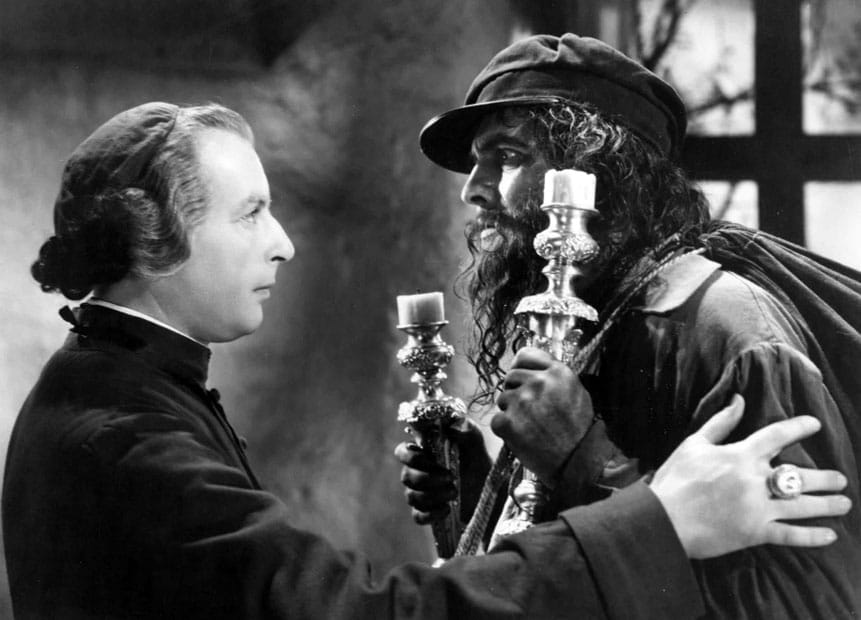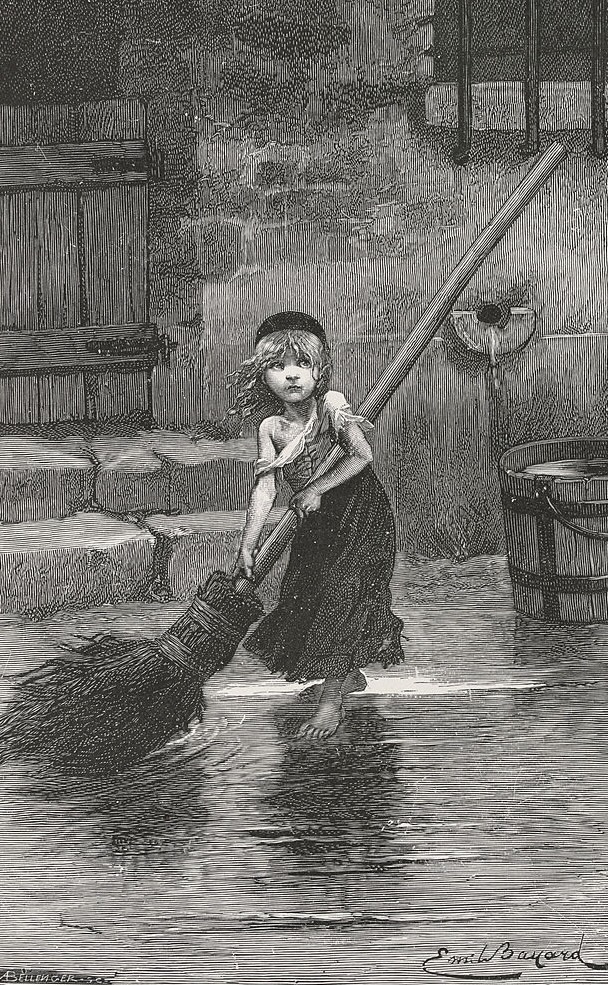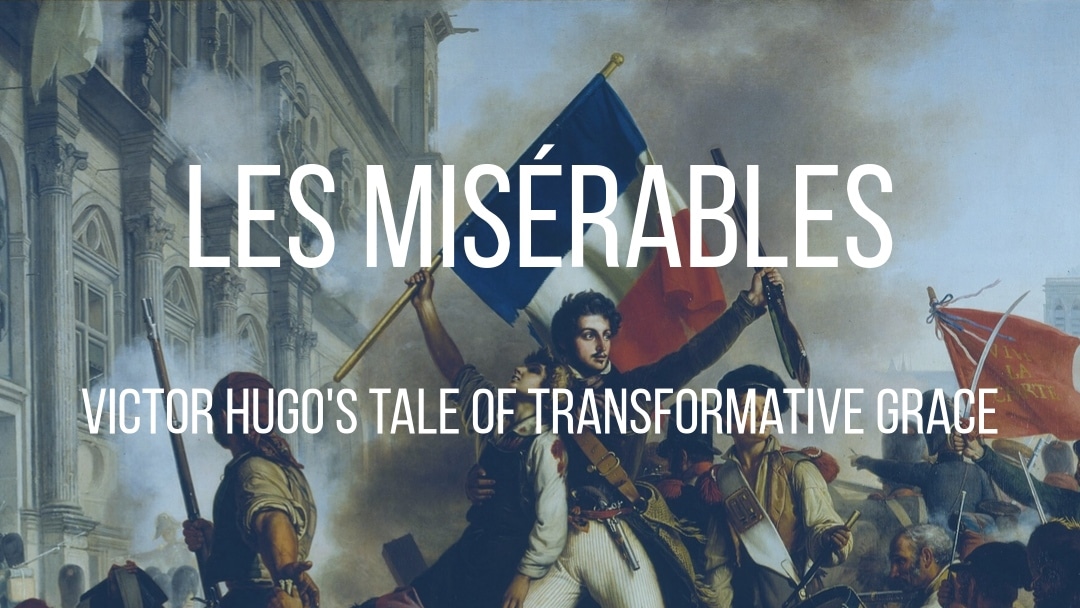A Great (and Weighty) Work of Literature That Will Delight
Like Moby Dick and War and Peace, Les Misérables is a hefty novel. Affectionately known as the ‘Brick’ for its formidable length, it could either frighten us away or be kept on a night stand as a trusty defense against would-be intruders. But that should not stop us from reading it.
I remember a packing trip in the backcountry of Glacier National Park. The heaviness of the pack always made that step onto the trail daunting, but the rewards of the glistening mountain lakes, the bighorn sheep, and the embrace of God’s beauty reflected in the natural world made us glad to have taken that first step. If you are willing to take the first step, Hugo’s novel will delight you with the beauty of a human spirit touched by the hand of God.
Abridged Adaptations of Les Misérables
Most of us are familiar with the stage and screen adaptations of Hugo’s work. As an early Christmas present, I took my wife and her father to San Diego’s Civic Theater to see Les Misérables the musical and quickly regretted not having brought a handkerchief or pack of tissues. Jean Valjean’s “Bring Him Home,” still moves me, even thirty years after I first heard it on stage in Chicago as a university student. At the time, I was not yet familiar with the story and had yet to open the cover of Hugo’s classic novel itself.
While it is easier to consume the abridged storyline of a two-and-a-half hour movie or slightly lengthier stage production, as in any adaptation, there is a depth of dialogue that is lost in translation. There is benefit in reading Hugo’s own words. They have greater spiritual and moral weight. They better illuminate the journey of lost and wayward souls than later adaptations. The title itself means, “The Miserable Ones” and aptly captures the plight of main characters Jean Valjean, Fantine, and Cossette.
Victor Hugo’s Exile
As I understand it, when Hugo wrote this novel, he himself was in political exile from France on the island of Guernsey in the English Channel, separated from the country he loved. He was fearful for its political future, but hopeful of what France could yet become.
The Spiritual Insights are Worth Hugo’s Historical Digressions
I will spare you a synopsis of the entire book—I hope that you will read it for yourself.
Fair warning: Hugo likes historical digressions. Part of the reason for the book’s length is that Hugo has a tendency to indulge in background history of 19th century France. You may find this reminiscent of trying to read the Bible front to back, but begins drowning in Leviticus. Don’t give up! His dialogue throughout is spiritually insightful and enriching—a big part of why I recommend the book!

The Bishop’s Act of Mercy and Grace
We have just celebrated the most transformative event in the Christian faith, the resurrection of Jesus from the grave. The resurrection, as Stu mentioned in last week’s blog, calls for a party. That which was dead is now alive. That which was lost is now found. That which was broken is now repaired. That which was unconquerable is now conquered.
In Hugo’s story, the protagonist, Jean Valjean is spiritually dead, lost, broken, and conquered. Imprisoned for stealing a loaf of bread to feed his sisters’ children, he is unraveled by an overly harsh penal system. Its injustice turns him into a hardened criminal. Released after 19 years of incarceration, he finds a liberty that is no less confining than the imprisonment he has experienced. Forced to carry a yellow passport that identifies him as a convict and unwelcomed by society, he would prefer living behind bars. Desperate to find lodging and a meal, a kind soul graciously directs him to the door of Monseigneur Bienvenu, the Bishop of Digne, a figure whose magnanimous character Hugo goes to great length to describe.
Many of you will know how the story unfolds. The Bishop of Digne’s kindness towards Jean Valjean in offering him room and board is repaid with thievery. In the early hours of the morning, while the whole house sleeps, Valjean absconds with a valuable basket of silver plates. Before he can make it out of town, though, he is confronted by the gendarmes, the city’s police force. Purporting a lie that the silver was given to him, the gendarmes march him back to the bishop’s residence to verify his claim. Before any accusations are brought the bishop declares,
“Ah, there you are!” said he, looking towards Jean Valejan. “I am glad to see you. But! I gave you the candlesticks also, which are silver like the rest, and would bring two hundred francs. Why did you not take them along with your plates?”
After the gendarmes release Valjean and depart, the bishop approaches him,
“Forget not, never forget that you have promised me to use this silver to become an honest man… Jean Valjean, my brother: you belong no longer to evil, but to good. It is your soul that I am buying for you. I withdraw it from dark thoughts and from the spirit of perdition, and I give it to God!”
The Resurrection of Jean Valjean
Valjean is perplexed—but not moved—by this act of mercy and grace. Like Judas, he takes leave with his newly acquired silver. On his journey out of Digne, he encounters a little boy whose loose coin falls at Valjean’s feet. Valjean covers it with his foot and refuses to return it to the boy. When the boy implores him to give back the coin, Valjean threatens him to get on his way. It is only when the boy has departed that something stirs deeply within Valjean’s soul, a conscience moved by guilt and remorse, regret that he has deprived the little boy of his coin. He desperately searches for the young lad in order to make amends but to no avail. In his sorrow, he is moved by an image of the bishop’s radiance which fills his wretched soul. He weeps bitterly,
While he wept, the light grew brighter and brighter in his mind⸺an extraordinary light, a light at once transporting and terrible. His past life, his first offense, his long expiation, his brutal exterior, his hardened interior, his release made glad by so many schemes of vengeance, what had happened to him at the bishop’s, his last action, this theft of forty sous from a child, a crime meaner and the more monstrous that it came after the bishop’s pardon, all this returned and appeared to him, clearly, but in a light that he had never seen before. He beheld his life and it seemed to him horrible; his soul, and it seemed to him frightful. There was, however, a softened light upon that life and upon that soul. It seemed to him that he was looking upon Satan by the light of Paradise.
Jean Valjean is resurrected. The dishonest man that he was is transformed into an honest man. The remainder of the story and its characters benefit from Jean Valjean’s radiant resurrection. It is a story of the consequences of grace—grace upon grace—redemption upon redemption.
The Value of 19th Century Fiction for Those of Us Who Preach the Risen Christ
When we come to the end of our rope, burdened by guilt, burned by remorse, and bloodied by a nagging conscience; when we realize how very defeated and dead that we are, there is only one hope for life. As the Bishop of Digne through his mercy and grace seared the retinas of Jean Valjean in Jean’s sorrow over his own sin, so has the mercy and grace of Christ shone brightly for us who live in the doom and gloom of spiritual death. The triumph of the resurrection allows us, like Jean Valjean, to look, “upon Satan by the light of Paradise,” that is to see the darkness and death that we once were from the light and life that we are now, through Christ whose resurrection has transformed us.
We may live as honest men and women, true to the image of God chiseled into us at creation. As Paul declares in his letter to the Ephesians, “because of his great love for us, God, who is rich in mercy, made us alive in Christ even when we were dead in transgressions—it is by grace [we] have been saved” (2:4-5, NIV), and in Colossians, “having put on the new self, which is being renewed in knowledge in the image of its Creator” (3:10, NIV),

we have now become agents of life. We are able to pass on to others the mercy and grace that God has shown us in Christ.
In our own spiritual resurrection, we can join Valjean, who, transformed into the man the Bishop of Digne declared him to be, charged those in his care:
Be an honest man! Be an honest woman!
Friends, Jesus says to you, “It is your soul that I am buying for you. I withdraw it from dark thoughts and from the spirit of perdition, and I give it to God.” May we find glimpses and reminders of the glorious Gospel story in the good stories we read!

Scott Bullock is a Board Member and Contributor with The Pastors Workshop. He is an ordained Presbyterian minister who has served churches in Illinois, New Jersey, and California. He holds an MA in New Testament Studies from Wheaton College, an MDiv from Fuller Theological Seminary, and a ThM in New Testament from Princeton Theological Seminary. Scott is married with three teen-aged children.
Don’t Miss
The Latest From Our Blog
New Site Launches Tomorrow!
Watch this Space! Tomorrow (May 29) is the official launch of the new The Pastor's Workshop site! Return to this blog tomorrow morning for a post highlighting the new features and explaining how subscribers can get on and start using the site! Here are some new...
How You Can Prep for Pentecost
This was originally posted on May 12, 2016 on https://huffpost.com Pentecost Came Like Wildfire I'm lying on an ice pack early this morning, doing my back exercises and listening to Pray as You Go, a tool for meditation, with monastery bells, music, and a Bible...
Sacred Spaces: the Church Forests of Ethiopia
Let's Go to Ethiopia! Here’s a fun exercise with a spiritual payoff. Go to Google Maps and view aerial images of the South Gondar zone of Ethiopia. Use this button:When the page loads, you'll see a light brown countryside, mostly farmland. There are thin lines of dark...




